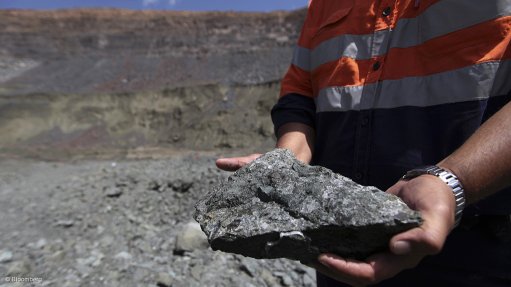
CARBONATION PROSPECT Kimberlite has been found to offer suitable properties for storing carbon through mineral carbonation technologies
Photo by: Bloomberg
Diamond miner De Beers Group is leading a research project that aims to deliver carbon-neutral mining at some of its operations in as little as five years’ time.
The company’s scientists, in close collaboration with a team of internationally renowned scientists, are investigating the potential to store large volumes of carbon at its diamond mines worldwide through the mineralisation of kimberlite tailings, the material that remains after diamonds have been removed from the ore.
Mineral carbonation is a process where rocks on the earth’s surface react with carbon dioxide sourced from the atmosphere and lock it away in safe, nontoxic, solid carbonate materials.
This is the first time such extensive research has been undertaken to assess the carbonation potential of kimberlite, which has been found to offer suitable properties for storing carbon through mineral carbonation technologies.
Mineral carbonation potential assessment studies are currently under way at De Beers’ Venetia mine, in South Africa, as well as at its jointly owned Gahcho Kué mine, in Canada.
Further research and detailed studies will continue this year and in 2018 to assess the carbonation potential at these and other De Beers mines.
De Beers started the project in 2016. Key parts of the early work centred on supporting academically focused mineral carbonation studies of old (before 1912) and recent (after 2008) kimberlite tailings samples from Voorspoed mine, in South Africa, which provide a great “natural laboratory” for understanding carbonation reactions in kimberlite.
The project aims to accelerate an already naturally occurring and safe process of extracting carbon from the atmosphere and storing it at a speed that could offset artificial carbon emissions.
The carbon storage potential of kimberlite tailings produced by a diamond mine every year could offset up to ten times the emissions of a typical mine, according to scientists’ estimations.
De Beers project lead for the initiative Dr Evelyn Mervine noted in a statement released earlier this month that this project offered significant potential to completely offset the carbon emissions of De Beers’ diamond mining operations.
“Mineral carbonation technologies are not new, but what is new is the application of these technologies to kimberlite ore, which is found in abundance in the tailings at diamond sites, and which offer ideal properties for the storage of very large volumes of carbon,” she explained.
As part of the project, De Beers is investigating how these existing technologies can be modified to develop specific solutions suitable for storing carbon in kimberlite tailings.
The research is in the early stages and it may take some time before it is economically or practically achievable to fully tap into this storage potential, but simply tapping into a small amount could greatly reduce the net emissions at many of De Beers’ mine sites in the near future, she explained.
“[This could] . . . possibly lead to carbon- neutral mining at some sites within the next five to ten years.”
Mervine added that, as technology improved over time, more carbon could feasibly be stored in kimberlite tailings, which meant the mines could, ultimately, offset more emissions than they produced.
The work being undertaken by the project team could also have significant applications for the broader mining industry, as the ideal carbon storage characteristics of kimberlite rock are also found in rocks mined for other commodities such as nickel and platinum.
“By replicating this technology at other mining operations around the world, this project could play a major role in changing the way not only the diamond industry but also the broader mining industry addresses the challenge of reducing its carbon footprint,” De Beers CEO Bruce Cleaver noted in the same statement.